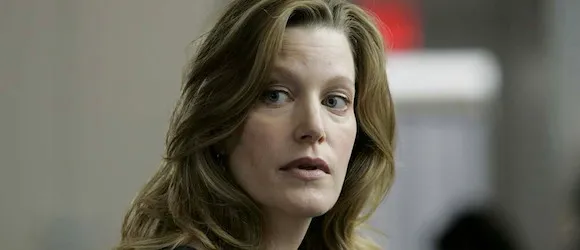While television is largely populated by male-helmed vehicles this summer (television is always populated by male-helmed vehicles), female characters are popping up in all sorts of interesting ways. Take it as another entry in the so-called Golden Age of Scripted TV, because women these days comprise a wide array of flawed and flawless, seen and unseen, known and unknown.
Let’s start with the undisputed best show on television. Breaking Bad, for all the praise heaped upon Bryan Cranston and Aaron Paul (and rightly so), has a remarkable star in Anna Gunn, who plays Walter White’s beleaguered wife Skyler. An oddly controversial character who can do no right in some viewers’ eyes, Skyler is a victim of what can reasonably be termed Betty Draper Syndrome. Betty Draper Syndrome is the problem of being a three dimensional female character in the intimate proximity of a narratively fascinating man. Any action that woman takes to scold, lambast, or otherwise curtail these men is viewed with the utmost prejudice by many viewers, who go to extreme lengths to justify the male protagonist’s unbelievable baseness (c.f. sleeping with all the women/making all the meth).
The criticisms are often lobbied at the woman’s iciness, stoniness, nagginess, or any other host of complaints that all fall under the distaff umbrella: she is criticized mainly for not being the right kind of woman. Skyler has fallen under this scourge, which is unfortunate, since she is one of the more richly complex characters on television. Too often in a scenario with a male protagonist and a dissenting wife, the wife is portrayed as a shrewish harpy, reduced down to such cardboard as to make you wonder exactly how it was that the seemingly delightful protagonist ended up with this woman in the first place. (See the execrable Midnight in Paris for an example — but don’t actually see it.) In Breaking Bad, the pairing is clear. Skyler and Walter are both irascible, stubborn, proud and more than a little pleased with their own desire to break bad. They belong together. It’s only fitting on a show known for flaunting convention that the wife is bedecked with a whole personality of her own, which allows her the flaws to have an affair and the ambition to be Walter’s newest money-launderer.
On Louie, the unseen ex-wife has an Adam Smith-ian hand in all the proceedings of the show. On the one hand, I want to give Louis C.K. (whom I love endlessly) the credit that he obscures his wife from the narrative arcs because he is giving some consideration and privacy to a real human being who may not really have consented to or feel great about the verbal treatment received on the show. And in part, I am sure that is true. (Although, his daughters, too, are real people who have no way of consent to their depiction.) On the other hand, her marked absence from the narrative rids her of the opportunity to make her side of things apparent. Male desire on Louie manifests itself in the absence of a woman’s body: over and over on the show it is made clear that Louie meditates on the theoretical presence of women far more often than women are actually present. When the woman’s body does show up, it is tired, bitter, and/or used up. (See “Bummer/Blueberries” for an example.) But the idea of the ex-wife is already described that way, leaving the actual presence of her to be an ongoing mystery.
The show is a poignant exercise in the various manifestations of love — here, I’m recalling his wonderful bit about the constant dichotomy of feelings about his children, where he describes both loving them entirely and wanting them to not be alive. But about his ex-wife, we only get some of column B. Which leaves me wondering about their column A, when it existed. On a show applauded for its nosing into those unpleasant crannies of everyday life, this one missing representation feels deliberate and strange.
On another comedian fantasy vehicle, Curb Your Enthusiasm started up again this past week and put the final nail in the coffin of the Cheryl/Larry rapprochement. Cheryl, in contrast with Louie’s ex-wife, has always been vitally present on Curb. Told through a perspective far more prone to mild conquest than Louie’s, Cheryl is a half-breed of her own being and of Larry’s imagining. (Did real-life Cheryl really forbid Larry from having his own toilet paper?) Cheryl’s personality often seems to shift based on what Larry wants from her at any given time: ever-suffering during their marriage, aggravatingly hard-to-get during their separation, girlish and coquettish during their brief reconciliation. With season eight’s opener “The Divorce,” Larry seems to be letting her out of his narrative finally, and though it would be a shame to see Cheryl Hines disappear completely, I think that’s the right choice.
Not many people are watching the inestimable Idris Elba on the BBC’s Luther, but suffice to say they did some fascinating things this second season. I’m not as intrigued by the hammy postcards-from-the-edge sociopath Alice as I am by the helpless but resilient Jenny and DS Gray. In each scene these two are in, the actresses do wonders demonstrating the ambiguity of their situations just in simple twists of their mouths. Brassy, headstrong, overstepping their bounds, to be sure — but the allowance of their flaws and their weaknesses (which are not the simple, cliched female ones) is buoying.
Especially so when faced with True Blood’s flailing Sookie, about which general disappointment is all that need be expressed.
Natasha Simons is a freelance writer living in Brooklyn who will defend Betty Draper to the death. She blogs here.








Published: Jul 15, 2011 12:34 pm